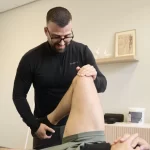Strength training for osteoarthritis - less pain through more strain
Why well-built strength training in osteoarthritis is one of the best forms of treatment
Osteoarthritis is very common. It is a chronic condition in which the cartilage in a joint deteriorates. This can cause pain, stiffness and difficulty moving. Many people think of osteoarthritis as "wear and tear", which often leads to the idea that rest or caution is necessary. But that view is outdated.
Nowadays, we know from good research that exercise - and in particular strength training - is actually hugely valuable for osteoarthritis. Instead of sparing your joints, you learn to support them with stronger muscles, and that brings a lot of health benefits.

Why osteoarthritis is no reason to sit still
Osteoarthritis is not a worn-out hinge that falls apart when you use it. On the contrary: it is an active process, influenceable by lifestyle, muscle strength, weight bearing, posture and degree of movement, among others.
Staying inactive leads to loss of muscle strength, balance and fitness. This makes daily activities such as climbing stairs, walking or getting up from a chair increasingly difficult. You then enter a negative spiral: more pain → less movement → even more symptoms.
Scientific evidence conclusively shows that regular exercise and especially strength training provides:
-
Less pain
-
Better joint stability
-
Greater freedom of movement
-
Improved muscle function
-
Higher energy level
-
Better mood and less fear of moving
Sources: Fransen & McConnell (2008), JAMA; Messier et al. (2013), Osteoarthritis and Cartilage; Goh et al. (2019), British Journal of Sports Medicine.

How strength training works for osteoarthritis
In osteoarthritis, the quality of cartilage changes, but the entire joint complex - including the muscles, tendons and joint capsule - is also involved. Strength training helps in several ways:
1. Less pressure on the joint
Stronger muscles around the joint literally take over some of the load. This reduces the peak load on the cartilage.
2. Better joint control and coordination
Strength training makes your joint move better and feel more stable, making you less likely to strain or misstep.
3. Pain relief via the nervous system
Strength training puts the body in an "active state", where pain signals are processed differently. Many people experience a reduction in pain within just a few weeks, without medication.
4. Improving mood and motivation
Being active gives confidence in your body and strengthens your own control over your health.
Note: the strength training must be properly built up and fit your load capacity. This is why personal guidance is important, especially in the beginning.

So won't I actually get more pain from exercising?
A logical question - and one we often hear. Fortunately, the answer is usually: no, if you build it up properly, you will actually get less pain. In the beginning, your body may react with some muscle pain or stiffness, especially if you have not been active for a long time. But this is normal and temporary.
Importantly, the exercises are tailored to your level. At Fysio Fitaal, we make sure you build up safely and gradually, so that your body has the chance to adapt. Scientific studies show that osteoarthritis pain actually decreases when you start exercising in a targeted and dosed manner.
So it's not about "training through the pain", but about moving smarter and more functionally so that your joints are better supported by your muscles. And that makes all the difference - in the short and long term.
Physio Vital and Vive Living
At Fysio Fitaal, we believe that every body is unique. That is why we offer support that really suits your personal situation - no standard programmes, but a tailor-made approach, tailored to your goals, capacity and daily functioning.
In this, we cooperate with Vief Life, specially developed for people with osteoarthritis who want to stay active. This collaboration enables both individual and group work.
Want personal guidance?
Then we start with an intake and physical examination, set clear goals and guide you one-on-one with a tailor-made exercise programme. You train under the supervision of a physiotherapist who closely monitors your progress.
Stronger together
Do you enjoy training with others? Then Vief Leven's group approach is for you. In small groups, you work on strength, mobility and stamina in a safe, structured way. Under professional guidance - with motivation from fellow participants.
In both pathways, we offer a safe build-up, good explanations and regular measuring moments. So you know exactly where you stand, and where you are working towards.


Related complaints

Traumatic osteoarthritis after a knee injury
Post traumatic osteoarthritis is a subtype of osteoarthritis and occurs after a significant injury

Hip Osteoarthritis
During ageing or damage, the quality of connective tissue decreases. As we age...
